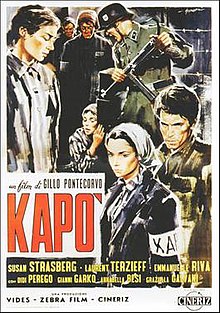Kapò
| Kapò | |
|---|---|

Italian film poster
|
|
| Directed by | Gillo Pontecorvo |
| Produced by |
Franco Cristaldi Moris Ergas |
| Written by | Gillo Pontecorvo Franco Solinas |
| Starring |
Susan Strasberg Didi Perego Laurent Terzieff |
| Music by | Carlo Rustichelli |
| Cinematography | Aleksandar Sekulovic |
| Distributed by | Cineriz |
|
Release date
|
|
|
Running time
|
116 minutes |
| Country | Italy France Yugoslavia |
| Language | Italian |
Kapò (Italian pronunciation: [kaˈpɔ]) is a 1960 Italian film about the Holocaust directed by Gillo Pontecorvo. It was nominated for the Academy Award as Best Foreign Language Film. It was an Italian-French co-production filmed in Yugoslavia.
Naive fourteen-year-old Edith (Susan Strasberg) and her Jewish parents are sent to a concentration camp, where the latter are killed. Sofia (Didi Perego), an older, political prisoner, and a kindly camp doctor save her from a similar fate by giving her a new, non-Jewish identity, that of the newly dead Nichole Niepas.
As time goes by, she becomes more hardened to the brutal life. She first sells her body to a German guard in return for food. She becomes fond of another guard, Karl (Gianni Garko). The fraternization helps her become a kapo, one of those put in charge of the other prisoners. She thrives while the idealistic Sofia grows steadily weaker.
When she falls in love with Sascha (Laurent Terzieff), a Russian prisoner of war, Edith is persuaded to play a crucial role in a mass escape, turning off the power. Most of the would-be escapees are killed, but some get away. Edith is not one of them. As she lies dying, she tells Karl, "They screwed us over, Karl, they screwed us both over." She dies saying the traditional prayer Shema Yisrael, to feel again her real identity.
The authors of the Foreign Film Guide, Ronald Bergan and Robyn Karney, write:
What does one say about this effort? Pontecorvo has jam-packed his film with every kind of tear-jerking cliché on offer and entrusted the debasement and regeneration of his heroine to a sadly inept actress. The result is an overheated melodrama which does a grave disservice to the enormity of its subject, although the horrors of the camps are realistically portrayed".
...
Wikipedia
